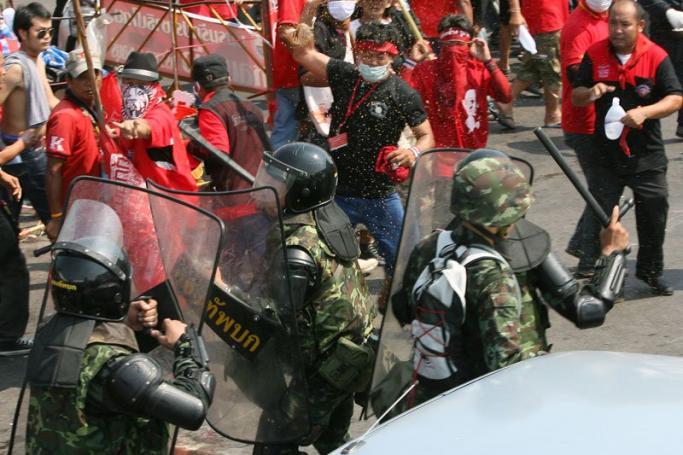Five years after a bloody Thai military crackdown on anti-government red-shirt demonstrators, relatives of those killed say unrepentant army rulers have failed in their promise to heal Thailand’s deep divisions.
Nongnai remembers the precise moment her younger brother died. The 38-year-old teacher was at work when the call came saying her sibling Attachai Anchalee had been struck by a soldier's bullet just above the heart.
She listened as a friend described the desperate efforts of medics to stem the bleeding and keep her brother's heart going with chest compressions.
"I was on the phone for 10 minutes... until he said my brother passed away," she told AFP from her home outside Bangkok, a picture of her brother on the mantelpiece. "He just stopped breathing."
Attachai, a 28-year-old law graduate, was one of at least 90 people killed during the crackdown in April and May 2010 that turned Bangkok into a battleground.
He was among thousands of "red shirts" loyal to ousted premier Thaksin Shinawatra who took over key intersections in central Bangkok that spring, demanding fresh elections to replace the pro-military appointed government. The massive protests brought to a boil years of resentment following the 2006 coup and his self-exile overseas.
It was the bloodiest episode of the country's past decade of political drama, as soldiers flanked by armoured vehicles fought running battles with protesters, leaving the streets strewn with corpses and parts of the capital in flames.
The military's first response to the 2010 rallies came on April 10 when units tried to take a junction controlled by the red shirts.
Gun battles broke out between armed protesters and soldiers. By the end of the night more than 20 lay dead, including at least five soldiers and a foreign journalist.
The more comprehensive crackdown that followed from May 13-19 eventually succeeded in clearing the red shirts.
But scores were killed inside army-declared "live fire zones" including many unarmed demonstrators, another foreign journalist and two medical volunteers.
Observers and rights groups accuse authorities of using excessive force, killing unarmed civilians as well as armed elements among the protesters.
No soldiers have been convicted of any wrongdoing, although the two civilian leaders at the time are facing an abuse-of-power probe.
Red-shirt leaders say the lack of convictions lays bare the impunity enjoyed by the military to intervene on behalf of anti-democratic forces.
The army assault was overseen by a core of senior officers with the backing of the civilian government. One of those officers, Prayuth Chan-ocha, was later promoted to army chief. He is now prime minister.
The army insists it was forced to act against armed protesters in 2010 while Gen Prayuth has angrily rejected any suggestion his soldiers targeted civilians.
Observers say many red-shirt supporters equipped themselves with a range of weapons - from homemade catapults to fireworks and petrol bombs. Other small groups of masked figures - dubbed "men in black" for their dark uniforms - were also seen among the crowds of red shirts toting automatic rifles and firing at soldiers throughout the clashes.
Yet academics and rights groups who have studied the crackdown say soldiers made little attempt to differentiate between civilian protesters and their armed supporters.
"It was excessive use of force against protesters," says Puangthong Pawakapan, a professor at Chulalongkorn University who has written a book about the crackdown.
"The idea was to destroy the red-shirt movement so that it couldn't come back," she says.
Of the 14 inquests carried out so far covering more than 20 deaths, nine found bullets from the military were to blame. In five inquests, the courts were undecided.
When Gen Prayuth grabbed power in a coup last May - this time following mass demonstrations against caretaker premier Yingluck Shinawatra that were not quelled - he insisted reconciliation between opposing camps would be a cornerstone of his administration.
But red-shirt supporters say they have seen little of that. Instead their leaders have been detained or silenced, while Ms Yingluck has been banned from politics and is facing criminal negligence charges.
Relatives of those killed say healing the wounds that have torn Thai society apart remains a distant dream while the military stay in charge.
"We know the military are not neutral," said Nongnai, who asked AFP to use a pseudonym out of fear of reprisals.
Red shirts are also alive to the reality that those "who had their hands in the killings have today returned to rule the country," says Pavin Chachavalpongpun, a Thai politics expert at Kyoto University in Japan.
Simmering with anger, the movement remains in lockdown. But relatives of those killed remain defiant and say they are not finished yet.
As Suriyan Pholsrila, whose husband Chanarong was gunned down on May 15, 2010, puts it: "Silence does not mean defeat".
© AFP
You are viewing the old site.
Please update your bookmark to https://eng.mizzima.com.
Mizzima Weekly Magazine Issue...
14 December 2023
Spring Revolution Daily News f...
13 December 2023
New UK Burma sanctions welcome...
13 December 2023
Spring Revolution Daily News f...
12 December 2023
Spring Revolution Daily News f...
11 December 2023
Spring Revolution Daily News f...
08 December 2023
Spring Revolution Daily News f...
07 December 2023
Diaspora journalists increasin...
07 December 2023












